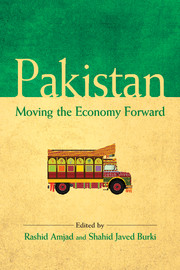Book contents
- Frontmatter
- Contents
- List of figures and tables
- Preface
- 1 Overview
- 2 Failed Economic Promise: Lessons from Pakistan's Development Experience
- 3 Economic Management Under IMF Tutelage: Key Lessons from the Musharraf and PPP Rule 1999–2013
- 4 A Country and an Economy in Transition
- 5 Tackling the Energy Crisis
- 6 Exports: Lessons from the Past and the Way Forward
- 7 The Future Path of Tax Reforms in Pakistan
- 8 Pakistan's Indus Basin Water Strategy: Past, Present and Future
- 9 Economic Governance and Institutional Reforms
- 10 Benefiting from Foreign Direct Investment
- 11 An Analysis of the Remittances Market in Pakistan
- 12 The Prospects for Indo-Pakistan Trade
- 13 Beyond the Poverty Line: A Multidimensional Analysis of Poverty in Pakistan
- 14 Can the New Intergovernmental Structure Work in Pakistan? Learning from China
- Contributors
- Index
5 - Tackling the Energy Crisis
Published online by Cambridge University Press: 05 May 2015
- Frontmatter
- Contents
- List of figures and tables
- Preface
- 1 Overview
- 2 Failed Economic Promise: Lessons from Pakistan's Development Experience
- 3 Economic Management Under IMF Tutelage: Key Lessons from the Musharraf and PPP Rule 1999–2013
- 4 A Country and an Economy in Transition
- 5 Tackling the Energy Crisis
- 6 Exports: Lessons from the Past and the Way Forward
- 7 The Future Path of Tax Reforms in Pakistan
- 8 Pakistan's Indus Basin Water Strategy: Past, Present and Future
- 9 Economic Governance and Institutional Reforms
- 10 Benefiting from Foreign Direct Investment
- 11 An Analysis of the Remittances Market in Pakistan
- 12 The Prospects for Indo-Pakistan Trade
- 13 Beyond the Poverty Line: A Multidimensional Analysis of Poverty in Pakistan
- 14 Can the New Intergovernmental Structure Work in Pakistan? Learning from China
- Contributors
- Index
Summary
Introduction
This chapter aims to discuss the crisis of the power sector in Pakistan and, more importantly, to suggest strategies and possible solutions in response. A sufficient energy supply is indispensible for all economic activity and for ensuring sustainable economic growth and development. Regrettably, Pakistan's power sector is beset by a crisis with the demand–supply gap growing continuously to unmanageable proportions. The electric power deficit has crossed the 5,000 MW level many times during 2011, 2012, and 2013; in June 2012, the shortfall surpassed 8,000 MW.
The main reason for this growing gap is not only the rising demand and high system losses, but also the declining generation capacity. Several factors are responsible for the latter: seasonal reductions in the availability of hydropower, shrinking indigenous gas resources, the country's heavy reliance on imported fuel oil for power generation, and forced power outages due to capacity degradation or scheduled outages for the maintenance of existing power plants. The unavailability of oil—given the economy's mounting circular debt as the government fails to adjust energy prices to reflect supply cost—has only accentuated the energy crisis. This has, in turn, severely affected economic growth: according to one estimate, power shortages have resulted in an annual loss of about 4 per cent of gross domestic product (GDP) (Kugelman, 2013).
The poor economic management of the power sector in Pakistan has created serious problems for fiscal managers, given the limited available budgetary resources and the need to put aside a substantial portion of revenues in subsidies given to the power sector. As much as 7.6 per cent of total revenues were used up in providing subsidies to the power sector in 2007/08. By 2010/11, this share had jumped to almost 18 per cent due to a one-off payment of PRs 312.8 billion and PRs 78.2 against previous years' unpaid power sector subsidies and commodity operations, respectively.
- Type
- Chapter
- Information
- PakistanMoving the Economy Forward, pp. 108 - 134Publisher: Cambridge University PressPrint publication year: 2015
- 2
- Cited by



